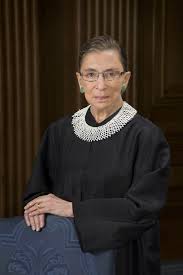 An interview with Justice Ginsburg appears in the October issue of Elle magazine. In the article, Justice Ginsburg describes her first oral argument before the United States Supreme Court. Any advocate could relate to her story:
An interview with Justice Ginsburg appears in the October issue of Elle magazine. In the article, Justice Ginsburg describes her first oral argument before the United States Supreme Court. Any advocate could relate to her story:
I had, I think, 12 minutes, or something like that, of argument. I was very nervous. In those days, the court sat from 10 to 12, and 1 to 3. It was an afternoon argument. I didn’t dare eat lunch. There were many butterflies in my stomach. I had a very well-prepared opening sentence I had memorized. Looking at them, I thought, I’m talking to the most important court in the land, and they have to listen to me and that’s my captive audience.
Justice Ginsburg argued on behalf of Sharon Frontiero in Frontiero v. Richardson. In that case the Court held that the United States military could not differentiate on the basis of gender in how it provides benefits to service members’ families.
In the interview, Justice Ginsburg recounts that as she spoke before the Court during oral argument her confidence grew:
I felt a sense of empowerment because I knew so much more about the case, the issue, than they did. So I relied on myself as kind of a teacher to get them to think about gender.
Her moment of rising confidence, came, without question, from deep preparation. There is so much I like about her description in these two sentences. For one, nothing compares to a successful oral argument for the feeling of empowerment Justice Ginsburg describes. For another, Justice Ginsburg understood the connection between an advocate and a judge when she called herself a teacher. Judges are not some sort of all-knowing, all-powerful Wizards of Oz; they must be taught the argument, through logic, precedent, and storytelling. Justice Ginsburg describes her approach to connect with the justices on an emotional level in the Frontiero argument:
[M]ost men of that age, they could understand race discrimination, but sex discrimination? They thought of themselves as good fathers and good husbands, and if women are treated differently, the different treatment is benignly in women’s favor. To get them to understand that this supposed pedestal was all too often a cage for women–that was my mission in all the cases in the ’70s. To get them to understand that these so-called protections for women were limiting their opportunities. I try to have them think what they would like the world to be like for their daughters and granddaughters. I think it makes a big difference if someone has a close relationship with a girl growing up.
A good advocate sees a case as a story of the client and the other side, but also understands how the judge and advocates fit into that story. I have heard more than one good advocate, and scholar of advocacy, say that the key to winning a case is to make the judge or the jury the hero in the story of the case.

I think that a true professional lawyer should work for her/his client. This should be first and last preference of a lawyer. Hero is only his/her client and none else.
Here’s an interview with Justice Ginsburg on MSNBC.